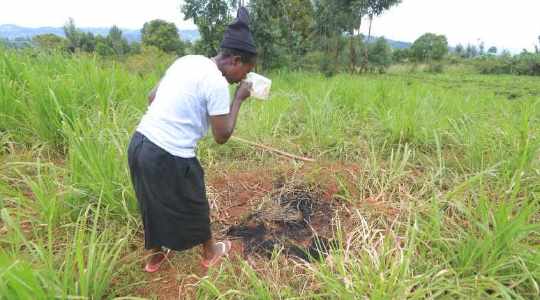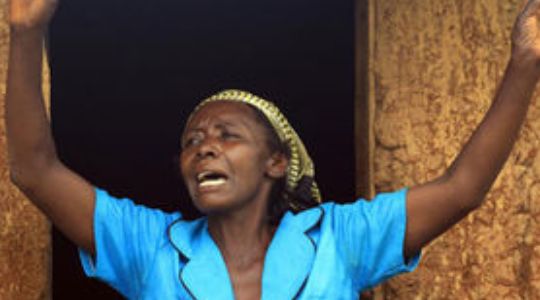History & Records
The Mob (IN)Justice: Where A RUMOUR Of Being A Witch Is A Death Sentence
Three blood-stained wooden clubs lying in a nappier farm farm tell how bloody it becomes if you are suspected of being a witch in Kisii’s Ikuruma village, Marani Sub-county.

The clubs were actually used by the killers of Kwamboka Iriera, 68, last week, on suspicion that she was a witch. Yes, suspicion.
“My mother pleaded with her assailants for hours to spare her life to no avail. She had been marked and it was just a matter of when they would kill her,” said Rebbeca Gesare, Kwamboka’s eldest daughter.
Gesare said their relatives and a section of local boda boda riders accused her mother of killing a two-year-old through witchcraft. She, however, believes there was more to the killing.
“She (Kwamboka) lived alone and I bet there is a scheme to sell her land after killing her,” she said.
On the same day, Charles Simba, Kwamboka’s immediate neighbour had his house burnt down on similar allegations. He was lucky to escape alive.
Marani Sub-county police Commandant David Too said officers are compiling “all evidence available, including pictorials to have Kwamboka’s killers nailed.”
But Kwamboka is just a statistic in the rising number of elderly women targeted by assailants who are out to wipe out black magic in Kisii and Nyamira counties.
In May 2008, a mob lynched at least 11 people accused of witchcraft in Marani, where traditional beliefs are rife. Majority of the victims were aged between 70 and 90, although one was just turning 40.

In the community, witches are often blamed for causing death through road accidents or serious illnesses.
Onsembe Community Development Organisation, working in the area, estimates that 35 people tagged witches have been killed in Kisii and Nyamira counties between 2009 and 2020.
“Keeping a black cat or living in poor conditions is enough ground for the elderly in this community to be thought of as practicing black magic and killed,” said Esnahs Nyaramba, the executive director of Onsembe.
Sibia Banchiri, 79, said the average elderly Gusii woman become targets of the accusations after death of their close relatives or neighbours.
“The women with well off children have opted to relocate from the area because of this nagging practice,” said Banchiri, who fears for her life.
Parts of the Abagusii community believe that a witch can influence a student’s performance in school, dictate how much one harvests on his farm and cause untold misfortune.
In January, Peter Nyagwachi reported to authorities that his wife Agnes Kwamboka, 60, had been picked from her house at around 3am by a group of killers who accused her of causing misfortune in the village.
Her body would later be found lying in a eucalyptus farm, about 50 metres away from her house witch deep machete cuts in Kisii County.
Two years ago, another woman from Bonyamatuta village in Nyamira was killed on suspicion that she was a witch. In both cases, suspects still remain at large.
In the villages of Nyang’iti, Ritembu, Itibo, and Mogenda in Kisii County, less than two kilometres apart, five people killed for being ‘witches’ lie in their graves awaiting justice. Relatives of the dead have fled in fear that they could be next.

Rev Lawrence Nyanugo of the Kisii South Pastors Fellowship believes the slow nature of the country’s justice system has made the perpetrators of the ‘ignorant killings’ to grow bold.
“Most of the targeted old people come to church for refuge, but it is high time the State should organise for massive civic education programmes on the subject to stem future unjustified deaths,” he said.
What remains certain in most of the witch-killing cases in Kisii and Nyamira is that the killers are known. Testifying against them in court is what remains to be worked on.
The perpetrators are often let off the hook by relatives of the killed ‘witches’ who move on or fear the repercussions of testifying against the killers.
As for Gesare whose mother was butchered last week, she has “left all to God”.
Follow us on social media:-

 News1 day ago
News1 day ago“Why I Stopped Supporting Atiku Abubakar” – Reno Omokri reveals
-

 Biafra1 day ago
Biafra1 day agoIPOB lawyer, Ejimakor Rejects FG’s Move To Set Date For Resumption Of Nnamdi Kanu’s Trial
-

 Education1 day ago
Education1 day agoNYSC DG speaks on N77,000 monthly allowance for Corpers
-

 Crime1 day ago
Crime1 day agoPolice arrest father and son for alleged m#rder of kinsman in Imo





